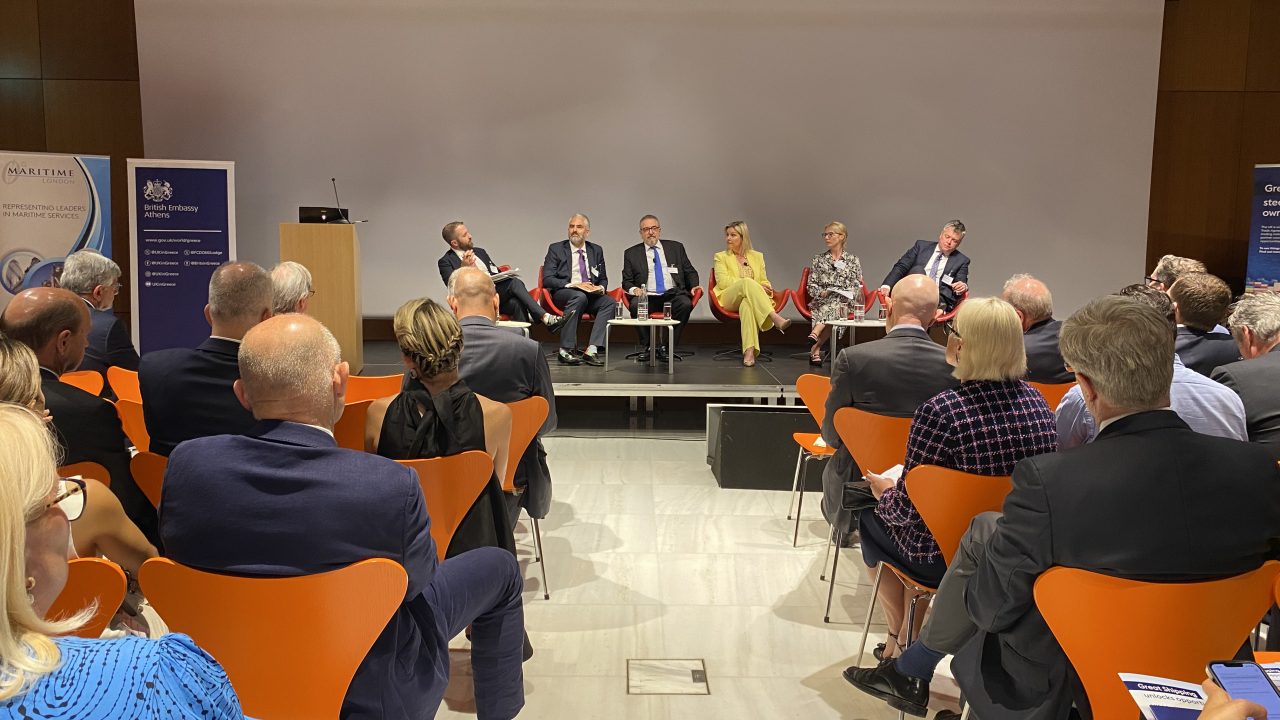Maritime London and British Embassy run a well-attended event in Athens
Posted on: 6 June 2024
Held as part of Posidonia 2024, the “Securing your ships from external disruptions: safety and decarbonisation perspectives” event took place on 4 June at the iconic Stavros Niarchos Foundation Cultural Center, concluding with a drinks reception hosted by the British Ambassador in Lighthouse, Niarchos’s rooftop venue.
The event was co-organised by Maritime London and the British Embassy in Athens, in partnership with Inmarsat, Lloyd’s Register and Lloyd’s List, and supported by the UK Department for Trade & Business.
The seminar delved into the crucial aspects of safeguarding ships and crews against external disruptions while also exploring the significance of safety and decarbonisation in the maritime industry (download the agenda HERE).
H.E. Matthew Lodge, UK Ambassador to Greece, delivered a keynote address. Alluding to shipping’s role as a major pillar of the Greek economy, Ambassador Lodge pointed out that “the maritime sector is also one of the major income generators for the United Kingdom and the City of London. The UK today is one of, if not the, leading global centres for maritime services with around a 25% share of the overall market.
“Greek shipowners are amongst the City’s biggest clients for legal, insurance, financial and brokerage services,” he continued. “Many made London their home during the first half of the past century and even if they have now moved elsewhere, many connections still endure.
The opening session of the seminar ‘Ensuring Safety in a Heightened-Risk Environment’ (pictured) considered the commercial implications of global trade disruption as a consequence of the well-publicised choke points in key shipping routes, and how the industry could work smarter to ensure the safety of assets and importantly seafarers. The panel included Eline Muller, Senior Executive, Multraship Towage & Salvage and Chair, International Salvage Union (ISU) Salvage Sub-Committee; Ben Palmer OBE, President of Inmarsat Maritime; Dr George D. Pateras, Deputy Chairman, Contships Management Inc and President, Hellenic Chamber of Shipping; Gordon Robertson, Head of Greece, NorthStandard; and Sally-Ann Underhill, Partner, Transportation, Reed Smith LLP.
Panel moderator Jos Standerwick, Chief Executive, Maritime London, said: “Global supply chains are under a perfect storm of geopolitical pressures and ships and seafarers are quite literally caught in the crosshairs. While the shipping industry has once again demonstrated the flexibility and resilience that is taken for granted, we need to learn lessons from the past and be more proactive.”
Entitled ‘Tramp Shipping – the Elephant in the Decarbonisation Room?”, the second session started with a scene-setting presentation delivered by Stephen Gordon, Managing Director of Clarkson Research, followed by a discussion. The panel included Nick Brown, Chief Executive Officer, Lloyd’s Register, Harry Fafalios, Chairman, Greek Shipping Cooperation Committee (GSCC), Michael Parker, Chairman, Global Shipping, Logistics & Offshore, Citi and Charis Plakantonaki, Chief Strategy Officer, Star Bulk Carriers Corp.
Richard Meade, Editor-in-Chief at Lloyd’s List, who moderated the panel said: “The general perception is that the liner sector is calling the shots when it comes to decarbonisation and that tramp players are in danger of getting left behind as they wait for a combination of regulatory and customer demand to force their hand. The debate explored why this was not necessarily the case why the tamp sector’s agility and pragmatism may yet deliver more sustainable efficiency gains than a future fuel pathway riddled with uncertainty.”
“What came out loud and clear from the event is that tramp shipping is not afraid to invest and it’s not afraid to take risks, but ultimately it is facing challenges to its business model and has limited agency to determine the political and commercial shifts that are heading its way.”




